You posted a photo of your dog on Facebook and all your friends liked it—building a Facebook page to promote your book to fans should be easy, right? Wrong! While your Facebook fan page may look the same and even function the same, the content and mission are completely different. You aren’t talking to your close friends and family, you are talking to over one billion potential viewers, because, unlike your personal Facebook page, your fan page is public and a vehicle of your social media marketing. Here are some tips to point you in the right direction.
The Facebook Algorithm
Before talking about what you should actually post, let’s talk to the elephant in the room: will anyone even see it? Unbeknownst to a lot of people, there’s a somewhat mysterious algorithm running behind the pages of Facebook. Not understanding how it works can leave you in a place where you are essentially shouting, but no one hears you. In fact, some reports show that when you post to your Facebook Page, only 2% of your audience sees it. Yikes, right?!
How does it work? In the simplest terms, Facebook looks at all the possible things a user can see on their wall and predicts what they are most likely to engage with. Facebook owns Instagram, and the order they publish content to a user's wall is very similar.
Facebook is a free website, and yet it makes billions of dollars. How is that possible? In a word: Ads. Facebook wants you to pay to get your audience to see the words you write on your page. I’ll cover the pros and cons of advertising below, but if you are leaning against not, there are definitely ways to make sure you are connecting with your audience. The best way to connect with your audience without paying is through Facebook Groups, which I’ll also cover below.
What’s On Your Mind?
So now that you know a little about how Facebook works, what should you post there? Whenever you post something on your personal Facebook page, there’s a little message in the text box that says “What’s on your mind?” It’s a call to action for everyone to post whatever rambling they happen to be thinking of: politics, family, religion, hobbies—it’s all fair game. Switch to your fan page and the message is a little different; it simply says “Write something.” It’s pretty vague, but the first thing to remember is this isn’t what’s on your mind—it’s about your author brand—you the author, and your books.
Who Is Your Audience?
Facebook reaches over one billion people, but that’s not your audience. You aren’t trying to capture one billion potential new readers—you aren’t even trying to get 1% of that! Think much, much smaller. Never post anything randomly. Before posting anything, ask yourself: who is my audience and does this post reach them? Your initial audience should be people who already know you, so make sure you promote your Facebook page in all of your books, emails, and websites.
Be Responsive
Your fans don’t just want to hear from you, they want to talk to you! When they comment on a post, make sure you are commenting back. Talking to your fans will keep them engaged and coming back. When possible, don’t be generic, be personal. Show an interest in who your readers are, beyond your book promotion.
Post Often. Post Consistently.
There’s no secret formula for exactly how many times each week you should post on Facebook, but most say 5 to 10 times per week is about right. That means 1 to 2 times a day. There are several tools that will post on a schedule, so if you have a hard time remembering to post each day, then once a week write all your posts and then schedule them. You don’t even have to log on to post them! Many writers will also have themed days to help their message stay consistent. Fridays, for example, are good days to post something on the lighter side—a funny meme, perhaps. Creating a hashtag for that day (such as #fridayfunnies) helps your fans see the theme and navigate back to other posts; think of original hashtags that no one else is using.
There are plenty of free tools (such as Hootsuite) that have free plans for controlling your message; these platforms help you schedule your post across all social media, so you don’t have to log in each day one by one. You can log into one social media content management system (or CMS) and control it all in one place.![]()
Start a Discussion
As noted above, Facebook values engagement. One of the best ways to get engagement? Get your audience to comment on your post. Facebook discourages people from outright saying “leave a comment below” but that doesn’t mean you can’t spark a discussion in your comment section by asking questions. Like “Who else is reading the new book in the X series?! No spoilers, but who would you like to see play each character in the film version?"
Facebook Analytics
Once you start building your audience, Facebook has lots of powerful tools to help you know who they are, what they like, and if your message is effective. It's easy to use. Just go to your fan page, and click on "Insights". Immediately you'll see an overview of your page; the left menu gives you over a dozen options to see even deeper insights (such as your reach, page views, and who exactly your audience is). Don’t assume you know your audience; use this tool to make sure you know them.
Facebook Groups
Facebook Groups are an alternative way to connect with your audience. What’s the difference? Thinks of groups as a more collaborative effort. Where a Facebook Page is about you and your message, a group is a place where everyone can talk. When done right, it can be a very lively and engaged community of loyal members. It comes, however, with a few disadvantages. Notably:
You must have a personal Facebook profile connected to it. You know, the one where you post nothing but dog memes and inspirational quotes! So if you don’t want anyone to know about it, then be careful here.
Those Analytics and insights that a Facebook Page brings? You won’t find them here. You only get very basic analytics about your group.
Many authors are starting to move towards having both a group page and a normal page--especially as their audience grows larger.
Use shareable purchase links with your followers or members of your Facebook group(s) to offer discounts or run promotions on your books. When readers purchase your book, IngramSpark ships it, and you get paid. Even at discounted prices, you can earn more on each book you sell.
A Digital Billboard for Your Author Brand?
Advertising used to be something you did when you had a few thousand dollars to blow; while print ads will still cost you thousands of dollars, digital ads cost only a few cents. You can set a marketing budget on Facebook for less than a cup of coffee. Because of the low cost, it’s an easy way to experiment with your message and see what works and what doesn’t. That’s not to say it should be taken lightly.
Do your homework. Research how Facebook ads work. You may only be spending a few dollars, but that’s still no reason not to spend it the right way. Facebook lets you target your ads as well; this means once you know who your audience is, you can more successfully promote your book to them. You could do an ad, for example, that reaches only men between the ages of 21 and 27 who like Joseph Heller's Catch-22.
Because Instagram is a part of Facebook, ads run through the same place. That will save you a lot of time when you're thinking about an ad campaign.
Boosting Posts on Facebook
When it comes to boosting a post on Facebook, it can be hard to know what to put money behind and what to post organically. We've got a few tips to help you.
Limit What You Boost
What if you are a highly successful person and have money to blow? You should boost everything, right?
Wrong!
Boosting too much content can make fans skim right over you. Everyone has that friend who posts way too many messages—they’re the friend you just scroll through when you see they’ve posted something. Using the boost too often puts you in danger of being that friend. You’ll essentially be paying to be ignored.
Who Do You Reach?
There are three people you can reach with a boosted Facebook post: fans only, fans and their friends, and an audience you select through targeting. So which one do you choose?
This is why it’s important to set goals before you think about pushing that boost button. If you’re posting something about your new book being a great Christmas gift, then boosting it to fans and their friends might help get you under the Christmas tree. If you are trying to get new fans, then targeting is a good option for you.
To Boost or Not to Boost...That Is the Question
A post about what you fed your cats for breakfast might put a smile on the face of a fan who happened to see your post, but it’s not going to sell more books. What post would? Let’s say you have a book signing coming up and you write a post about it—that’s a post worth boosting, but make sure it’s only to fans within a certain mile radius of the signing.
What’s Your Calling?
Ideally, you want your fans to do something with any boosted Facebook post. With that in mind, make sure you have a call to action. Do you want them to like your post? Comment on your post? Visit your author website? There should be a clear path that you want the fan to follow, which you can also use to measure the success of your campaign.
Make It Stand Out
The average person on Facebook has over 300 friends. That’s a lot of friends! If you have over 300 friends, how many do you think are memorable? If you don’t make yourself stand out as one of those memorable friends, then chances are they won’t even see the post you just paid to boost. Use photos that stand out and limit the amount of text you post—a very concise but well-written sentence will work. Humor is often important, but not essential. Just make the content count.
The Facebook Algorithm was built in a way that it encourages you to pay to play—really the only way to ensure more than 2% of your audience sees your message is to buy ads. It’s easy to see it as just another place to waste time and not get anything in return. And it is...when you do it wrong. But when you spend the time to map out an actual Facebook strategy, then you will find that your book promotion goes further and your fans start becoming much more loyal—not only buying one of your books, but buying all of them—and telling all of their friends to do the same.














